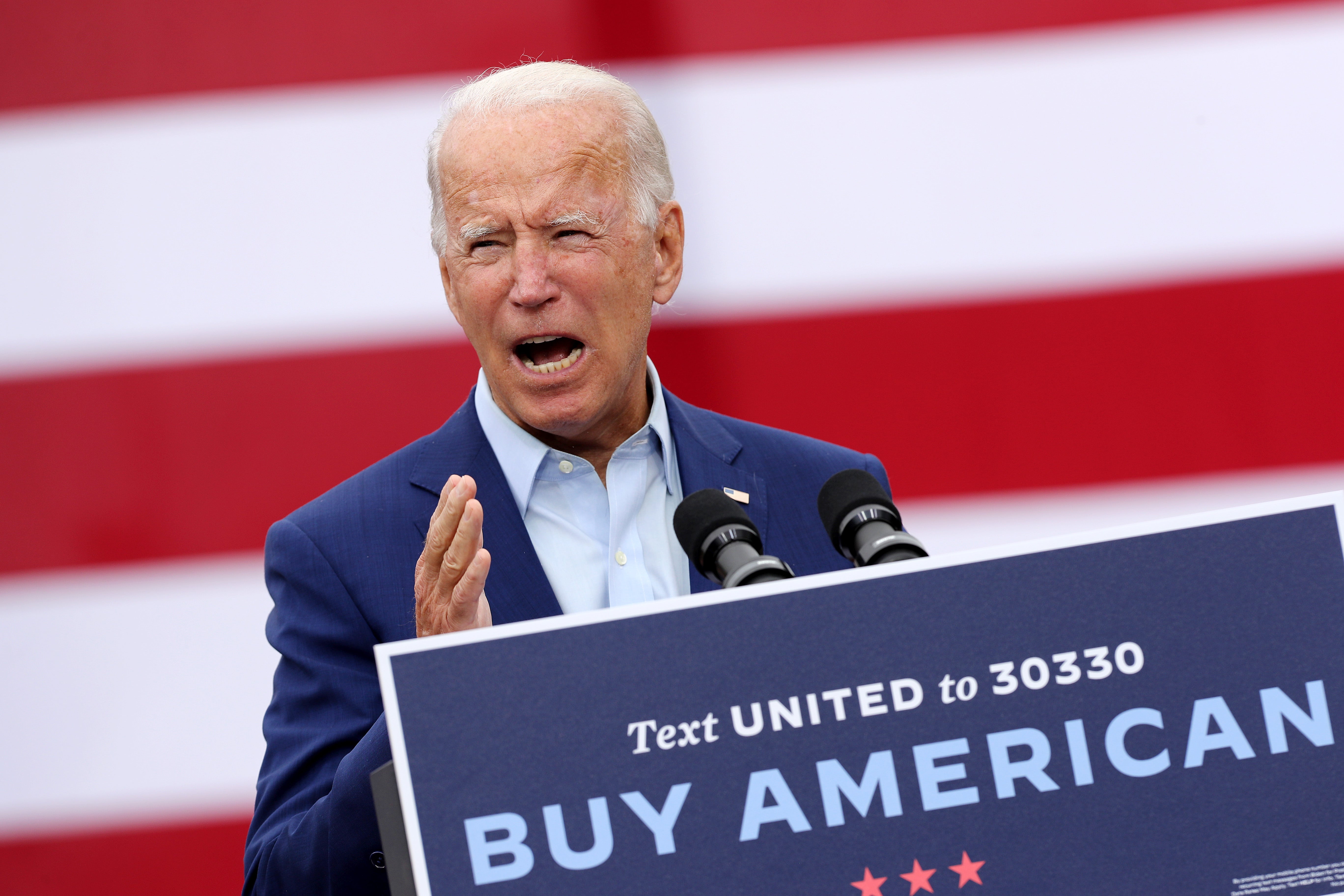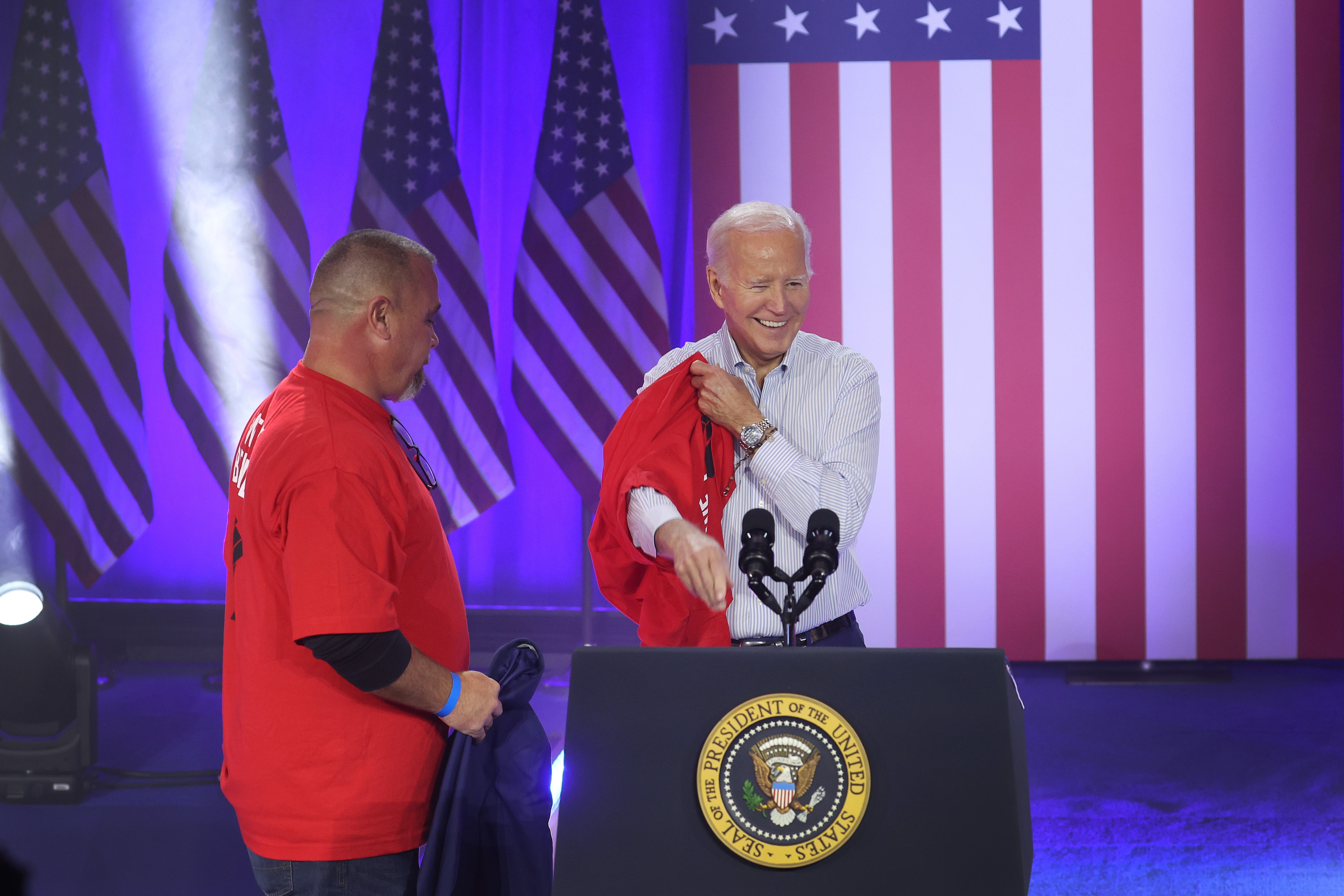This is how Democrats can win back working-class voters. But should they even try?
Gustaf Kilander speaks to a Democratic strategist, a union organizer and researcher, and the director of a progressive think tank on the route to a Joe Biden win in 2024

Your support helps us to tell the story
From reproductive rights to climate change to Big Tech, The Independent is on the ground when the story is developing. Whether it's investigating the financials of Elon Musk's pro-Trump PAC or producing our latest documentary, 'The A Word', which shines a light on the American women fighting for reproductive rights, we know how important it is to parse out the facts from the messaging.
At such a critical moment in US history, we need reporters on the ground. Your donation allows us to keep sending journalists to speak to both sides of the story.
The Independent is trusted by Americans across the entire political spectrum. And unlike many other quality news outlets, we choose not to lock Americans out of our reporting and analysis with paywalls. We believe quality journalism should be available to everyone, paid for by those who can afford it.
Your support makes all the difference.The fundamentals are there for Democrats to win in 2024, but what’s the best route for getting there?
Focusing on abortion rights and a Republican Party led by Donald Trump being a threat to democracy, or leaning on pocketbook issues like jobs and raising wages?
The answer most likely lies somewhere in between. Political campaigners increasingly see convincing voters who have departed their side of the aisle to come back as a waste of time, while others say it’s vital to winning elections – persuasion versus mobilisation.
‘A return to New Deal-style policies’
Dustin Guastella, a researcher at the Center for Working-Class Politics and the director of operations for Teamsters Local 623, tells The Independent that Democrats must focus on a “progressive jobs agenda” meaning “investing in good high wage, likely to be union jobs”.
“There’s a very large group of working-class voters that really do want a return to New Deal-style policies and New Deal-style social programs,” he says, adding that “if you can win the majority of working-class voters, I think you have a very good chance of winning presidential elections because most … are concentrated in swing states. They are the largest section of the electorate and they’re the most influential”.

Speaking about recent elections, he says that Democrats have been “offering a bland message, a reversion to the mean … ‘we need sanity in Washington, we need to come together, we need to stay the course’” and “not really offering much of a vision for fixing what’s wrong”.
“Voters actually do want a progressive economic message. They just don’t particularly like some of the social rhetoric that many progressives have attached to that economic programme,” he argues.
Meanwhile, Danielle Deiseroth, the executive director at the progressive think tank Data for Progress, tells The Independent that “access to abortion is going to be one of the most persuasive issues”.
‘Swing voters becoming an increasingly rare breed’
“If you voted for Joe Biden in 2020, there’s a very high likelihood you’re going to vote for Joe Biden in 2024. The same goes for people who voted for Donald Trump. The actual number of movable swing voters is becoming an increasingly rare breed, especially considering gerrymanders that have made even fewer competitive House districts,” she adds.
Democratic strategist Joe Trippi says that the most important thing Democrats can do between now and election day is to draw clear contrasts between President Joe Biden and the “chaotic … MAGA cult”.
There’s been a “changing alignment of the parties” for the past six to eight years, which includes working-class voters moving towards the GOP. “I think Biden in particular has a stronger argument to win them back than people think,” he tells The Independent, citing the president’s support for unions, and legislation passed in his first term on infrastructure and manufacturing, the results of which will kick in more and more as the election approaches.
But he emphasizes the difference between voters who backed Mr Trump once in 2016 and those who voted for him twice.
“I think the people that that won Biden the election, were the people who voted for Obama [in 2008], Obama [in 2012], Trump [in 2016], Biden [in 2020],” he says.
“I think that’s the group that Biden needs to keep or win back,” Mr Trippi says amid miserable polling results for the president in swing states.
“There’s a very small sliver of actually movable folks right now,” Ms Deiseroth says. Similarly to Mr Trippi, she says that if someone backed Mr Trump in 2016 and 2020, Democrats probably shouldn’t spend time and money on getting them back in the fold.
She adds that the key voting blocks will be “young people, voters of colour, women – especially suburban and or non-college educated women – It’s getting them excited and getting them to turn out and vote for Biden again”.
Mr Guastella notes that in 2020, “the dismissal of rising crime from progressives was very off-putting” to working-class voters, as was “big ticket, progressive-era race rhetoric” as well as the discussions about immigration.
“I think these are issues that Democrats really hammered home in 2020. So they did not talk about those issues very much in 2022. But they also didn’t talk about jobs, and they didn’t talk about economic issues, which is the big tell,” he adds.
Name the enemy and define villains
Ms Deiseroth notes that there are “broader reproductive, economic intersectional policies … access to affordable housing, affordable childcare. I think those are some of those sorts of wedge issues that are going to be coming up for a lot of these voters” but she adds that the “existential question of abortion and personal freedoms” is going to continue to persuade people to actually show up to vote.
Both Ms Deiseroth and Mr Guastella say Democrats need to pick high-level fights to garner attention and take on their opponents head-on.
“They need to have a more of a populist message. They need to actually name the enemy … the upper reaches of our society, the elite, the economic elite, and the political elite,” Mr Guastella argues. “They need to drive that home rhetorically … many in the Democratic Party don’t do this. In fact, they shy away from this kind of language thinking that it’s right-wing or conspiratorial.”
“I think it’s about teeing up high-profile fights,” Ms Deiseroth says. “I think it’s about going where Republicans won’t go.”
“I don’t think Trump and Republicans would go as far, even if they’re able to obfuscate their actual stances on privatizing Social Security or Medicare. They wouldn’t go so far as to say ‘tax the wealthy’ to protect this programme,” she adds.
She argues Democrats need to be “intentional about not only drawing a contrast with Republicans but actively going for big fights that will get more media attention – defining villains, for example, on the prescription drug pricing, all these big pharma companies have filed lawsuits to prevent these drug price negotiations from being able to take effect”.
Mr Trippi notes that because of the Electoral College, fewer than half a million voters in six or seven states will decide the election, and there’s not a “one-size-fits-all” message to appeal to these voters.
“I would not recommend getting into ‘oh, we have to go after all workers that are drifting away from us in all 50 states,’” he says.
‘College-educated white-collar workers have won the war’
Mr Guastella adds that it’s “always difficult to make the case that this or that message is going to be the thing that wins an election … because there’s just so many other factors”.
“The non-college-educated working class is concentrated in areas that have long been dominated by conservative elites. So there is a certain geographic distribution that just plays into it in a large way,” he notes.
The researcher and union organizer says that “the fracturing of the working class means that these people live very different lives and very different worlds”.
“The goal of the Democratic Party should be to try to bridge some of those economic divides. Instead, it seems that … the college-educated white-collar workers have won the war inside the Democratic Party – their issues are the number one issues”.
Democrats “campaigned on climate change, they campaign on racial justice, they campaign on abortion, they campaign on a lot of different social issues … that white collar college educated voters really, really gravitate toward and push in their personal and political lives,” according to Mr Guastella.
He adds that unless Democrats start to focus more on wages, jobs, and employment, working-class voters are bound to “go hunting elsewhere”.
“Unfortunately, the Republican Party has been trying to make explicit overtures toward working-class voters without a college degree by saying that all those issues that college-educated voters care about are stupid and bad, and in fact, ‘we’re the party of jobs,’” he says.
‘There’s going to be a trade-off’
Mr Guastella adds that “Democrats have been focusing on abortion because of the overturning of Roe v Wade – I completely understand the motivation for that – but if you’re making all of your campaigns about abortion, you’re going to lose working-class voters.
“And if your goal is to win working-class voters, there’s going to be a trade-off there. Because if voters see us primarily caring about abortion, and not caring about their paychecks, their wages, their jobs, they’re going to look elsewhere for who does care about those things.”
Ms Deiseroth says she “would like to see and I think we’re starting to see Democratic candidates talk about Social Security and Medicare protections, and I would encourage expansion to draw contrast much earlier in the campaign cycle”.
“People can only pay attention to so much – the laundry list of Biden accomplishments on the economy is like 20 things long,” she adds. “But it’s nailing and scaling on the ones that are most popular with lower awareness and tying it all together in a nice bow with the notion that Democrats are going to protect your personal and economic freedoms and Republicans won’t,” she adds.
Asked about Democrats’ chances in 2024, she says “the fundamentals are there”.
“If there’s one thing that we can count on it’s that Donald Trump and Republicans are going to keep being the party of big business and restricting abortion, and those are really good things for Democrats to hit on,” she notes.
Join our commenting forum
Join thought-provoking conversations, follow other Independent readers and see their replies
Comments